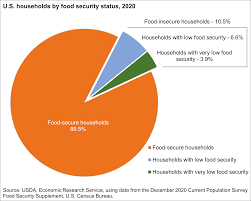Food security is often something that we as a whole overlook. Having access to daily meals and other foods is a luxury and a privilege, not a right. We often think that since we live in such a developed country, with a higher income per capita than a majority of the world that this issue is not that big of a deal, except it is. According to Feeding America, “In 2020, an estimated 1 in 8 Americans were food insecure, equating to over 38 million Americans, including almost 12 million children”. This is a staggering number that clearly shows the extent of the effect that it has over our own country. Another important thing to conceptualize is that there is no one specific group of people who is affected specifically by food insecurity as it “is in every community” according to Feeding America. Below is a chart that visualizes food insecurity in America.  As you can clearly see a large portion of America is food secure, but still the slice of people who are not food secure is still incredibly large.
As you can clearly see a large portion of America is food secure, but still the slice of people who are not food secure is still incredibly large.
Works Cited:
https://www.google.com/url?sa=i&url=https%3A%2F%2Fcovid19.census.gov%2Fdocuments%2F6cf4af1ff4de4c04ad30001046685636&psig=AOvVaw1RrNohIGekR-rdrlrA23dp&ust=1651605413495000&source=images&cd=vfe&ved=0CAwQjRxqFwoTCNDjwOTDwfcCFQAAAAAdAAAAABAD
https://hungerandhealth.feedingamerica.org/understand-food-insecurity/


